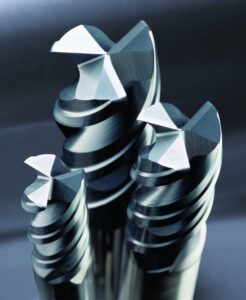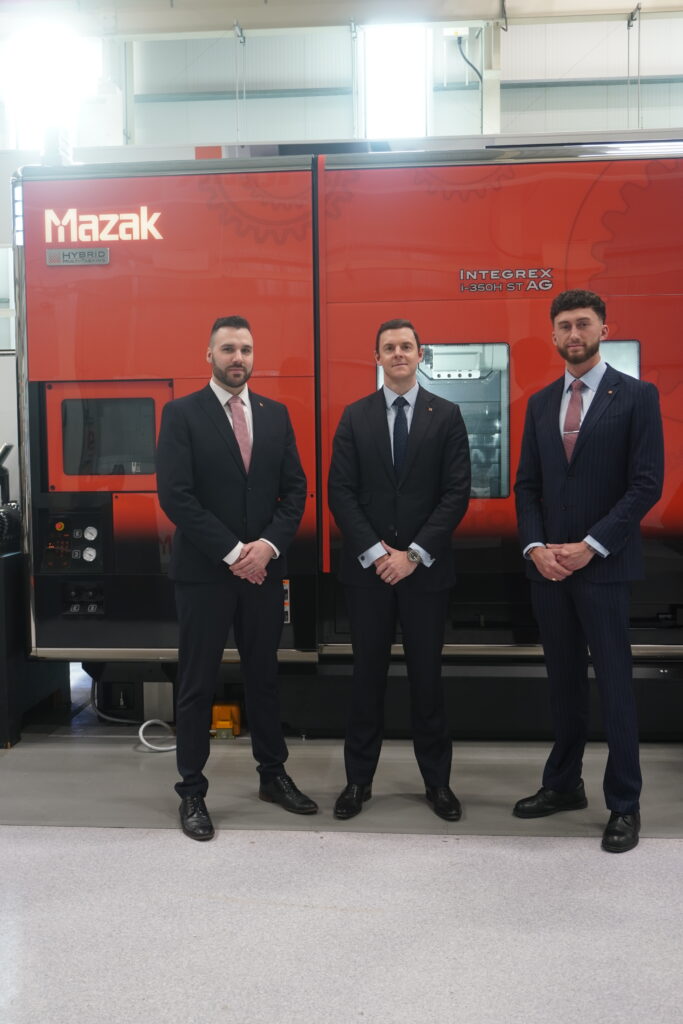SGS Carbide Tool set to launch Series 33 high performance end mills at EMO
Estimated reading time 6 minutes
SGS Carbide Tool (UK) will launch its new Series 33 range of high performance 3-flute end mills for difficult materials and challenging applications at EMO.  The new product series is launched in support of the company’s on-going commitment to high performance tooling and continuous improvement.
The new product series is launched in support of the company’s on-going commitment to high performance tooling and continuous improvement.
Available with a corner radius, the new Series 33 end mills are ideal for aggressive ramping, pocketing and slotting of materials such as stainless steel, titanium and Inconel. The open structure at the axial end accommodates chip material flow and reduces the loading during machining operations on aerospace structural components, medical implants and devices, as well as high performance automotive and motorsport components.
EU Managing Director, Alan Pearce, explains the three technical advantages offered by the new Series 33. “A stepped core design provides optimal chip control and rigidity when the flute is completely engaged. Secondly, a unique geometry has been engineered with variable helix and pitch configuration to provide chatter and vibration suppression. Finally, symmetrical end gashing offers superior balance combined with a high level of strength and ramping capabilities,” he says.
The new tool series was developed using the latest in engineering design and grinding capabilities and is available exclusively with Ti-NAMITE-A, the most abrasive resistant SGS coating for superior wear, built-up edge resistance and increased tool life.
Visitors can watch demonstrations of the Series 33 tools in action on the company’s stand. A 5-axis DMG DMU 75 monoBLOCK will be powered up on the stand and cycled through ‘typical’ customer components in a variety of materials, including aluminium, titanium and carbon fibre reinforced plastic.
As well as the company’s industry leading solid carbide cutting tool technology, the 200 m2 stand (Hall 5, Stand B42) will also feature the full-size model of the Bloodhound Super Sonic Car. It is the first time the Bloodhound SSC has been exhibited outside the UK, and SGS is both a product and a project sponsor. The company will highlight the areas where SGS solid carbide cutting tools have helped meet and surpass the challenges involved with taking a hybrid jet/rocket powered, four-wheeled vehicle up to and beyond 1,000 mph.
Having built an enviable global reputation within industry sectors where cutting tool performance and reliability are the only measures that matter, the SGS S-Carb APR range of three- and four flute roughing tools and the S-Carb APF four-flute finishing tools, for machining aluminium, non-ferrous, and non-metallic materials offer exceptional machining performance benefits.
Alan Pearce, explains: “Ideally suited to machining aircraft grade aluminium, as well as non-ferrous and non-metallic materials, the S-Carb APR and APF range of three- and four-flute end mills have been designed and developed with all the necessary machining process parameters in mind.” The S-Carb APR roughing tool features three feed holes for spiral through tool coolant supply, and a high pressure coolant supply (50 to 70 bar) aids chip evacuation at the elevated material removal rates achieved. In actual customer roughing trials on wing spars and aerospace structural components, SGS improved the machining strategy with power roughing and material removal rates were significantly increased. It proved an S-Carb APR tool can halve roughing cycle times, and a 25mm diameter SGS cutter can surpass the material removal rates of a 50 mm diameter indexable router up to 12,000 cc/min. Actaul cutting tests have proved that cycle times can be reduced from over 12 hours to under 3.5 hours.
Designed for optimum finishing of thin walled components the S-Carb APF high efficiency four-flute end mill has twin feed through tool coolant supply, and is equipped with three-stage chatter suppression to remove any negative harmonic influence on the workpiece or the cutting tool. Stage one uses unequal flute spacing to disrupt the rhythmic pattern created by the cutting edge of the typical end mill. The company’s patented unequal helix design alters the angle at which each cutting edge enters and exits the component material, eliminating harmonics. The final stage is provided by a variable rake geometry which changes the size and shape of the chip created and takes chatter suppression to a whole new level.
A new line of composite cutting tools was recently introduced by SGS and these will also be highlighted at the show. The new programme addresses the unique challenges of cutting composites by offering a series of four new tools and a further expansion of an existing product range.
The new Series 120 8-facet drill has been designed and developed to successfully create accurate holes without splintering or delamination of the composite stack. The stable, double margin construction drill is manufactured exclusively with the SGS Di-NAMITE crystalline diamond coating for even wear, extended tool life and improved finishes.
Extending the popular Series 20 CCR (Carbon Composite Routers) SGS has added the new Series 31. This series of carbon composite routers feature fewer and deeper flutes than the original Series 20 CCR to avoid clogging during demanding slotting and roughing applications. Both the new Series 31 and the Series 20 CCR expansion are available with or without the proven Di-NAMITE coating.
For milling and finish cutting operations on carbon composite material, the recently introduced Series 25 Compression Router incorporates a left- and right-hand helix, and is designed to compress the workpiece to eliminate the fraying of material. These new tools are also available with or without a Di-NAMITE coating.
The Series 27 variable geometry slow helix end mill is designed for milling highly abrasive materials, where the tools benefit greatly from the optional Di-NAMITE coating. The innovative cutting tool technologies combine substrate, geometry, edge preparation and coating for an optimal combination that can withstand the complex conditions faced by manufacturers machining composite materials.
“Around the world, leading companies involved in the motorsport, medical and aerospace industry sectors look to SGS for solutions. Not only are they machining difficult materials, but they also need performance levels that will keep them profitable, retain tight control on geometric form and provide an exceptional surface finish. Our cutting tool range has been developed to meet and even exceed these demands, and the benefits they offer are now available to general engineering companies looking for more from their cutting tools,” concludes Alan Pearce.


